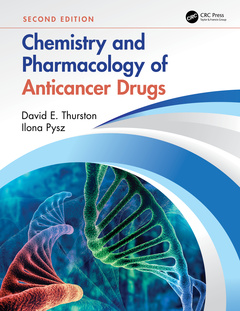Chemistry and Pharmacology of Anticancer Drugs (2nd Ed.)
Auteurs : Thurston David E., Pysz Ilona

While drug therapies developed in the last 80 years have markedly improved treatment outcomes and the management of some types of cancers, the lack of effectiveness and side effects associated with the most common treatment types remain unacceptable. However, recent technological advances are leading to improved therapies based on targeting distinct biological pathways in cancer cells. Chemistry and Pharmacology of Anticancer Drugs is a comprehensive survey of all families of anticancer agents and therapeutic approaches currently in use or in advanced stages of clinical trials, including biological-based therapies.
The book is unique in providing molecular structures for all anticancer agents, discussing them in terms of history of development, chemistry, mechanism of action, structure?function relationships, and pharmacology. It also provides relevant information on side effects, dosing, and formulation. The authors, renowned scientists in cancer research and drug discovery, also provide up-to-date information on the drug discovery process, including discussions of new research tools, tumor-targeting strategies, and fundamental concepts in the relatively new areas of precision medicine and chemoprevention.
Chemistry and Pharmacology of Anticancer Drugs
Key Features:
- Summarizes the fundamental causes of cancer, modes of treatment, and strategies for cancer drug discovery
- Brings together a broad spectrum of information relating to the chemistry and pharmacology of all families of anticancer agents and therapies
- Includes up-to-date information on cutting-edge aspects of cancer treatments such as biomarkers, pharmacogenetics, and pharmacogenomics
- Features new chapters on the "Evolution of Anticancer Therapies", "Antibody-Based Therapies", and "Cancer Chemoprevention"
Chapter 1 Introduction to Cancer Chapter 2 The Evolution of Anticancer Therapies Chapter 3 Antimetabolites Chapter 4 Antitubulin Agents Chapter 5 Nucleic Acids as Therapeutic Targets and Agents Chapter 6 Small-Molecule Targeted Therapies Chapter 7 Antibody-Based Therapies Chapter 8 Endocrine Therapies Chapter 9 Immunomodulatory Therapies Chapter 10 Alternative Tumor-Targeting Strategies Chapter 11 The Precision Medicine Approach in Oncology Chapter 12 Chemopreventive Agents
David Thurston is Emeritus Professor of Drug Discovery in the Institute of Pharmaceutical Science (IPS) at King’s College London. He has a first degree in pharmacy, an MSc in Precision Medicine and a PhD in synthetic medicinal chemistry, and has worked at two schools of pharmacy in the USA (University of Texas at Austin and Kentucky Colleges of Pharmacy) and four in the UK (the Portsmouth, Nottingham, London University and King’s College School of Pharmacy). David’s academic research team discovered the first C8-linked sequence-selective DNA-interactive PBD dimer, analogues of which are now used as the payload component for Antibody-Drug Conjugates (ADCs) in development by a number of companies world-wide as cancer therapies (e.g., Loncastuximab teserine). David has co-founded a number of oncology biotech companies including Spirogen Ltd in 2000 (which commercialized the PBD dimers, and was acquired by AstraZeneca/Medimmune in 2013), and Femtogenix Ltd in 2015 (which works on next-generation sequence-selective DNA-interactive ADC payloads, and for which he still acts as CSO).
During his academic career, David has supervised numerous PhD students and postdoctoral research fellows, and has been the PI of several major Program Grants from funders including Cancer Research UK. He has many publications in medicinal chemistry/chemistry journals and books, and is currently Editor-in-Chief of the Drug Discovery book series of the Royal Society of Chemistry.
Ilona Pysz has a first degree in Forensic Science, an MSc in Cancer Pharmacology and a PhD in Pharmaceutical Science in which she produced a number of novel Antibody-Drug Conjugates (ADCs), and developed a hydrophobicity assay which allows the physico-chemical properties of ADC payloads to be evaluated and compared. She has previously worked within the Bioanalysis and Safety Assessment (Toxicology) departments at Covance Inc (where she was responsible for overall pre-clinical stud
Date de parution : 03-2021
21x28 cm
Date de parution : 03-2021
Ouvrage de 416 p.
21x28 cm
Thèmes de Chemistry and Pharmacology of Anticancer Drugs :
Mots-clés :
Cancer Research; Drug Discovery; Pharmacology; Metastatic Breast Cancer; tumor-targeting strategies; Creative Commons Attribution Share Alike; Cancer Stem Cell; drug discovery process; DNA Methylation; biological-based therapies; Ve Breast Cancer; anticancer drugs; ADC; PBD Dimer; Cremophor EL; Til Therapy; Inotuzumab Ozogamicin; GnRH Agonist; PARP Inhibitor; GnRH Antagonist; Alk Positive NSCLC; DNA Array; PDX Model; Sacituzumab Govitecan; Anti-androgen Agents; Gemtuzumab Ozogamicin; Chemopreventive Agents; Interstrand Cross-links; AI; CA125 Level; Porfimer Sodium; DNA Minor Groove



